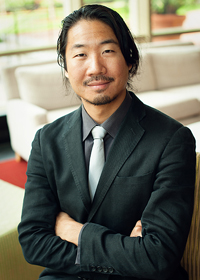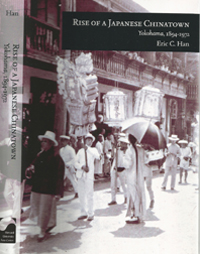埃里克·韩探讨了横滨唐人街的民族主义和身份认同
{{youtube:medium|qw4lsFfJcCo, Eric Han discusses “日本唐人街的兴起:横滨,1894-1972.”}}
As the country struggles to define what it means to be “American” in the face of increasingly thorny immigration issues, the history of a Chinatown halfway across the globe could hold clues to navigating competing identities.
William & Mary Associate 历史 Professor Eric Han’s 日本唐人街的兴起:横滨,1894-1972, published by Harvard University’s Asia Center in June, recounts the town’s unique history and its residents’ struggle to carve out a workable identity.
Han’s inquiry began in 1996, when he arrived in Tokyo with a fresh degree in molecular biology and a plan to teach 英语.
“I made a day trip to Yokohama and I couldn't help but notice the Yokohama Chinatown,” he said. “This was a bustling, vibrant community, very different from New York's Chinatown. 我想知道这些人的身份。 他们会像华裔美国人一样吗? 他们如何调和自己的中国和日本身份? I presumed they would have some of these dilemmas, and I wondered if the way they would resolve those dilemmas would be similar to the way I understood my own.”
 Han said he was fascinated with how Yokohama’s Chinese understood their relationship with Japan.
Han said he was fascinated with how Yokohama’s Chinese understood their relationship with Japan.
“I saw in this the possibility of some way to reconcile conflicts, this longstanding rivalry and conflict between China and Japan, because here clearly is a community of Chinese who have made peace with Japan,” he said.
“Does that mean that they are less Chinese? 这是否意味着他们秘密地认为自己是日本人? These are the questions I wanted to answer.”
He spent many afternoons with Yokohama’s elderly, combing through archives, brittle newspaper clippings and faded mimeographed newsletters. He also hung around the city’s library, poring over old local newspapers “that wouldn't be archived here in the United States and are of relatively marginal interest even in Japan.”
这条探索之路最终导致韩从自然科学转向历史,他断断续续地在日本呆了几年,试图解决这个独特的群体如何理解自己的亲密问题。
“If you go through the day-by-day articles, you do start to get a sense of how the town was stitched together by groups of culturally and ethnically different people,” he said. “You do start to see incidents: brawls between Chinese and Japanese, divorces between Chinese and Japanese, descriptions of Chinese food written by Chinese cuisine aficionados in Japan. You start to see the texture of the daily life and the way that national categories don’t really capture the actual connections between people and the lives that were lived during that time.”
One family’s dilemma
The Bao family’s remarkable history illustrates some of the tensions the Chinese community faced in Yokohama.
这家餐厅的老板鲍唐(Bao Tang)在19世纪七八十年代从中国搬到横滨,娶了一位日本女子,开了一家成功的餐厅,将广东菜引入日本。 这对夫妇有几个孩子,因为他们的父亲是中国人,他们本身就是中国公民。
但这种公民权在第二次世界大战期间受到了极大的考验。 Two of Bao Tang’s sons joined the Japanese army (as a medic and a translator, respectively), one of them dying in the fighting in China.
Bao Tang’s third son joined the opposing Chinese army, as a doctor.
第四个儿子鲍伯公(Bao Bogong)留在横滨经营家族餐厅,但并未受到影响。 Japanese authorities compelled him to make statements legitimizing Japan’s war in China.
“The Bao family allows me to make two very interesting arguments,” Han said. “On one hand, I want to point to the dilemmas individuals face with these national categories. 如果你的生活碰巧跨越了国界和国家身份,你经常会被要求做出这些非常困难的决定。 I think this problem has actually become more prevalent today, more than ever.”
他说,包家也说明了基于血统的入籍要求是如何导致荒谬的结果的。 Bao Bogong was half Chinese, but was considered a Chinese citizen under Japan’s nationality law, as his sons would have been.
“This, if nothing more, should give readers the understanding of how artificial national identity really is,” Han said. “You can see that a national identity is more a matter of legal maneuvers and procedures than any actual heritage.”
Weighty stuff, but Han also deals a bit of humor with a light hand, as he includes as the lone appendix Bao Bogong’s recipe for “Bok Choy and Whole Braised Chicken.”

“I spent quite a bit of time discussing the rise of Chinese cuisine in Japan and how those developments influenced the way Japanese people viewed the Chinese,” he explained. “I thought it would be of academic interest – or perhaps culinary interest – to include one of his recipes. 食谱本身也很迷人。 It's extraordinarily labor-intensive and probably typical for recipes from that time period … This was not a recipe designed for the convenience of busy city dwellers.”
Han refers specifically to step three: “Carefully remove the bones from the chicken, retaining the shape of the chicken as much as possible.”
‘Together, with a difference’
Like the Bao family, many of Yokohama’s Chinese tried to sidestep airtight national identities during peace and war both by developing a local identity as “hamakko,” or Yokohama-ite, which allowed them with varying degrees of success to freely form ties with their host country while not denying their “Chinese-ness.”
“Most of these people have come to an understanding of themselves not just as nationals, as Chinese and Japanese, but also as local residents,” he said. “They are able to build an identification with their local community, which then allows them to build solidarities between themselves and people of other nationalities.”
横滨特有身份的想法也使日本能够容忍华人社区的发展,而不会将其视为对其同质文化叙事的威胁。
Han notes a Japanese saying that illustrates this as it pokes at the difference in what it means to be “native” to Tokyo (edokko) versus Yokohama (hamakko): “It takes three generations to be an edokko, three days to be a hamakko.”
“[My study] is looking very seriously at the way that a migrant group can become integrated into a society which does not have the policies, nor the public expectation, that they can naturalize,” Han said. “So this is a story about integration into a non-immigrant-receiving country, and I find that to be fascinating.
“They have created their own space there, but they've largely dodged the question of assimilation into the wider collective. They are together, but with a difference,” he continued. “This is something I think scholars are starting to accept and propagate now, that we don’t have to merge with the collective to be a member of a society.”
As such, Yokohama’s Chinese hint that how we define ourselves can be deliberate, rather than being foisted upon us by external or capricious powers. 我们在如何定义自己方面有能动性,并且可以创建承认这种能动性的社区。
"Our lived local communities are authentic identities,” Han said. “We should not be focused entirely on our origins, on our citizenship. 生活在当地的社区也可以成为我们身份认同的对象和轨迹。 This is in some senses cosmopolitan and democratic, because these are communities in which all of us – regardless of legal status, regardless of citizenship – are already implicated and are already participating.
“I do believe the type of solidarity that can arise from that can be a useful counterbalance to a lot of the national stereotypes and national conflicts that seem to be so difficult to resolve around the world."


